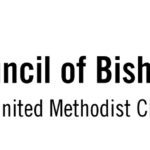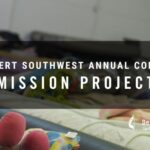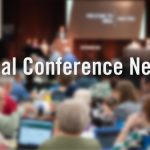 By Rev. Dr. Dottie Escobedo-Frank
By Rev. Dr. Dottie Escobedo-Frank
It didn’t look like anything out of the ordinary for the border town of Nogales. My hometown is used to seeing Border Patrol facilities, and we have always noted the humanitarian actions of the staff. They see the same things we do on the ground, and you can’t be human without being moved. So, when a group of United Methodist pastors and church leaders met outside the facility that housed about 1,000 unaccompanied children that we’d been hearing about in the news, well… I wasn’t so impressed. We met outside a gate-like entry that said, “U.S. Border Patrol, Nogales, Arizona.” That was it.
But Special Operations Supervisor, Gustavo Soto, met us outside the gate and began telling us the story of the children. About a month and a half ago the children started arriving from Texas. There are typically around 1,000 children, sometimes more, sometimes less. All the children in this facility are unaccompanied minors. Ok, I don’t know about you, but that fact alone took my breath away. The oldest is 17, and the youngest was a newborn, delivered at Holy Cross Hospital in Nogales.
Children come in and out in the processing ritual. Sometimes 300 children are bused in per day, and the same go out. You can see the buses on the hillside. While there, they get bathed, medical care, and they make phone connections with family members. They have Red Cross volunteers to play with the children, and Chaplains help with the spiritual needs. They are divided into age groups and gender, and sibling groups are allowed to see each other whenever they ask. They have a playground. And they have toys. Everyone falls in love with the children.
But the children wear the same outfits while inside, and they have strict protocol to keep everyone healthy. And they are not allowed to leave, of course, for this is only a stopping point along their already-lengthy journey. They seek a land of freedom and possibility, but this is a necessary pause along the road.
We asked questions about why they came here, and what the journey is like. They live in violence, under threat of death by gangs, extreme poverty, and weak structures. Their parents hope for a life without violence and with food on the table. So they believe the story that there is a better place for their children, and they pay the human trafficker to take their children on a journey across national borders and through deserts and mountains, on buses and other forms of transportation. The human traffickers leave them at the Rio Grande River, which is the natural border in Texas, and the children are set on rafts, or they swim, till they make it to the other side. When they hit American soil, they are known to run to the Border Patrol personnel with relief and gratitude for a country that will take them in and give them safety, and maybe even hope.
We wanted to find out how the faith community could help. But, they are children who need to be protected from the public. We felt somewhat helpless for a moment. But suddenly that unassuming sign that said “Border Patrol, Nogales, Arizona” had a different meaning. There were children there! Many thousands of children who are looking for help in our country… Children who left their families because life at home was unbearable. Children who were lonely, and sad, and happy, and hopeful. They missed Mom and Dad, and Grandmother. Children who were braver than I could imagine… Children who had traveled alone seeking hope and life… Suddenly I felt as if I was standing outside holy ground, and I didn’t know what to do.
There are some things we can do. We are still figuring them out. But so far these things pop out:
- We can pray. Pray every day for the children and their families, their countries, and for peace to rule over violence. Bishop Carcaño has called July 18-20 (from sunset to sunset) a weekend of prayer. You can join this movement and follow it at http://www.theyarechildren.com.
- UMCOR, at the request of Bishop Hoshibata, has secured a $10,000 grant which will be filtered to the ministries that are helping the children and parents who end up at the bus stations. We can help by volunteering at the bus stations, especially if you are blessed with the Spanish language. And we can donate to UMCOR at http://tinyurl.com/UMCOR901670.
- We can volunteer through Red Cross, attending training and volunteering to play with the children in facilities http://www.redcross.org/support/volunteer.
- Churches can work with the Office of Refugees Resettlement. After leaving the facilities, they will place the children in caring environments, and volunteers are needed to assist and provide care. http://www.acf.hhs.gov/programs/orr/resource/unaccompanied-childrens-services . Or connect with foster care agencies that are looking for foster families to care for the children temporarily.
- We can call our Congress members, and urge them NOT to repeal the provisions in the William Wilberforce Trafficking Victims Protection Reauthorization Act (TVPRA). This would help to prevent returning children into the hands of traffickers and violent situations.
- We can advocate for reform and safe borders through the various groups connected with the Arizona Interfaith Network. They work for change at the national level, bringing together people of all faiths for the common good.
- We can connect with Border Community Alliance at http://www.bordercommunityalliance.com. They are hard at work to improve the vitality of U.S. and Mexico border communities.
I left the meeting with the kind Border Patrol gentleman, and the overwhelmed church leaders, feeling like something extraordinary was going on in this spot of earth that I call my hometown. I felt overwhelmed by the great need, but if each of us did one thing listed above, together we could create a place where this facility would be empty, and where children were free from harm and welcomed everywhere. I’m sure of that.
And I left with a deep image from my own family. My grandmother, Sarah Estrada, who crossed the Rio Grande herself, while having labor pains, so that my father, Rev. Louis Escobedo, could be born in America. She didn’t do it for economic reasons, but because she wanted her child to have religious freedom. That child of hers became a Lutheran pastor and missionary to Mexico. And I am his daughter, a United Methodist Pastor and District Superintendent, the granddaughter of one who crossed the Rio Grande with dreams. I am grateful for her, and for a country that welcomed me. I join with you in prayer….




